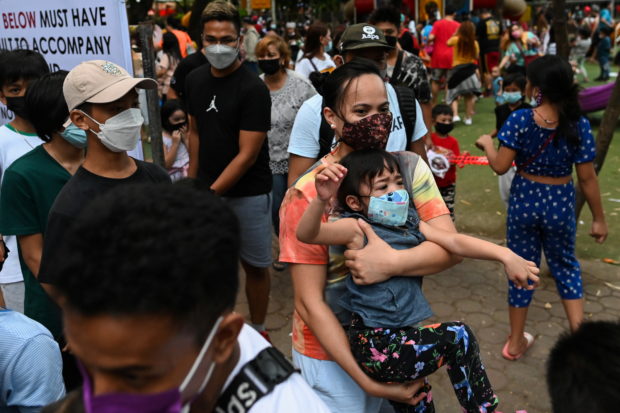
Parents and children prepare to leave a public park during its closing time, as the country’s capital region loosens coronavirus disease (COVID-19) restrictions, in Quezon City, Metro Manila, Philippines, November 2, 2021. Picture taken November 2, 2021. REUTERS/Lisa Marie David
MANILA, Philippines — The Philippine National Police (PNP) recorded 97,635 violations of minimum public health and safety protocols against COVID-19 in the National Capital Region (NCR) Plus areas from November 5 to November 8, or since Metro Manila was placed under Alert Level 2.
Nationwide, 144,295 violators of minimum public health and safety protocols were recorded for the same period — which means that 67 percent of the violations occurred in NCR Plus areas, including Metro Manila, and neighboring provinces of Bulacan, Cavite, Rizal, and Laguna.
Numbers from the PNP released on Tuesday showed that of the 97,635 violators, 81,757 were warned, 12,636 were fined, and 3,242 received other penalties.
Health protocol violations include not wearing or improper use of face masks, and disregarding physical distancing.
On other violations, like going outdoors during curfew hours, there were still 9,048 violators in NCR Plus areas who were given warnings, while 1,044 were fined.
Another 2,185 were warned for leaving their households despite not being an authorized person outside of residence (APOR).
The combined total for all quarantine-related violations in NCR Plus — from breaching minimum public health and safety protocols, curfew hours, and rules on APORs — is at 118,881. This number includes the 97,635 health protocol violators.
Across the country, the grand total for all quarantine-related violations is at 167,404 — including the 144,295 health protocol violators nationwide.
Over the last weekend, netizens on social media took notice of the busier roads and the higher number of children in public areas like malls, parks, and other places of leisure in Metro Manila, after the national government placed NCR under Alert Level 2.
The downgrading of quarantine restrictions came as COVID-19 cases saw a sharp decrease, after the surge last August and September which was caused by the Delta variant.
However, authorities especially from the Department of Health (DOH) have warned against being too relaxed, as the pandemic’s threat along with other variants — like the Delta subvariant — is still present.
On Monday, DOH said that they have detected the B.1.617.1 COVID-19 variant in Pampanga — the strain formerly known as the Kappa variant, which was designated by the World Health Organization as a variant under monitoring.
While the Kappa variant has been deescalated by the WHO, it might still “pose a future risk.”

